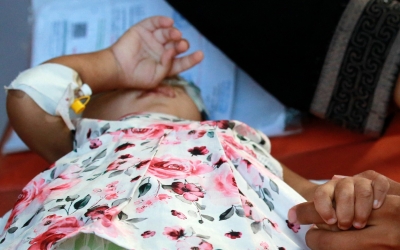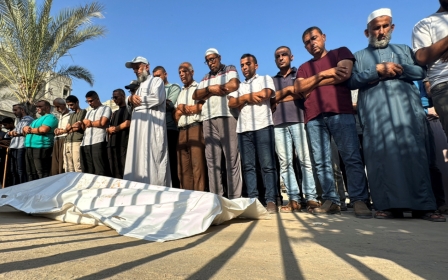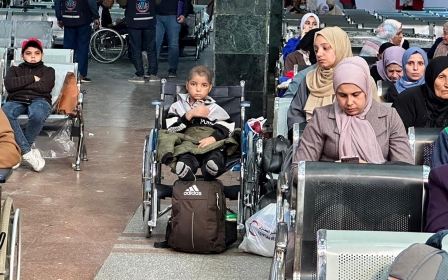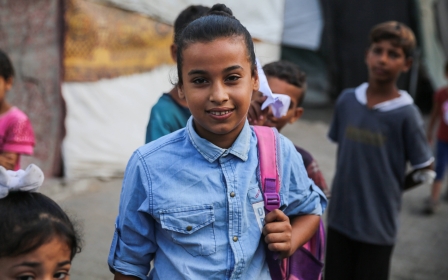‘Please take us to mum’: Families torn apart by Israel's occupation of Rafah crossing
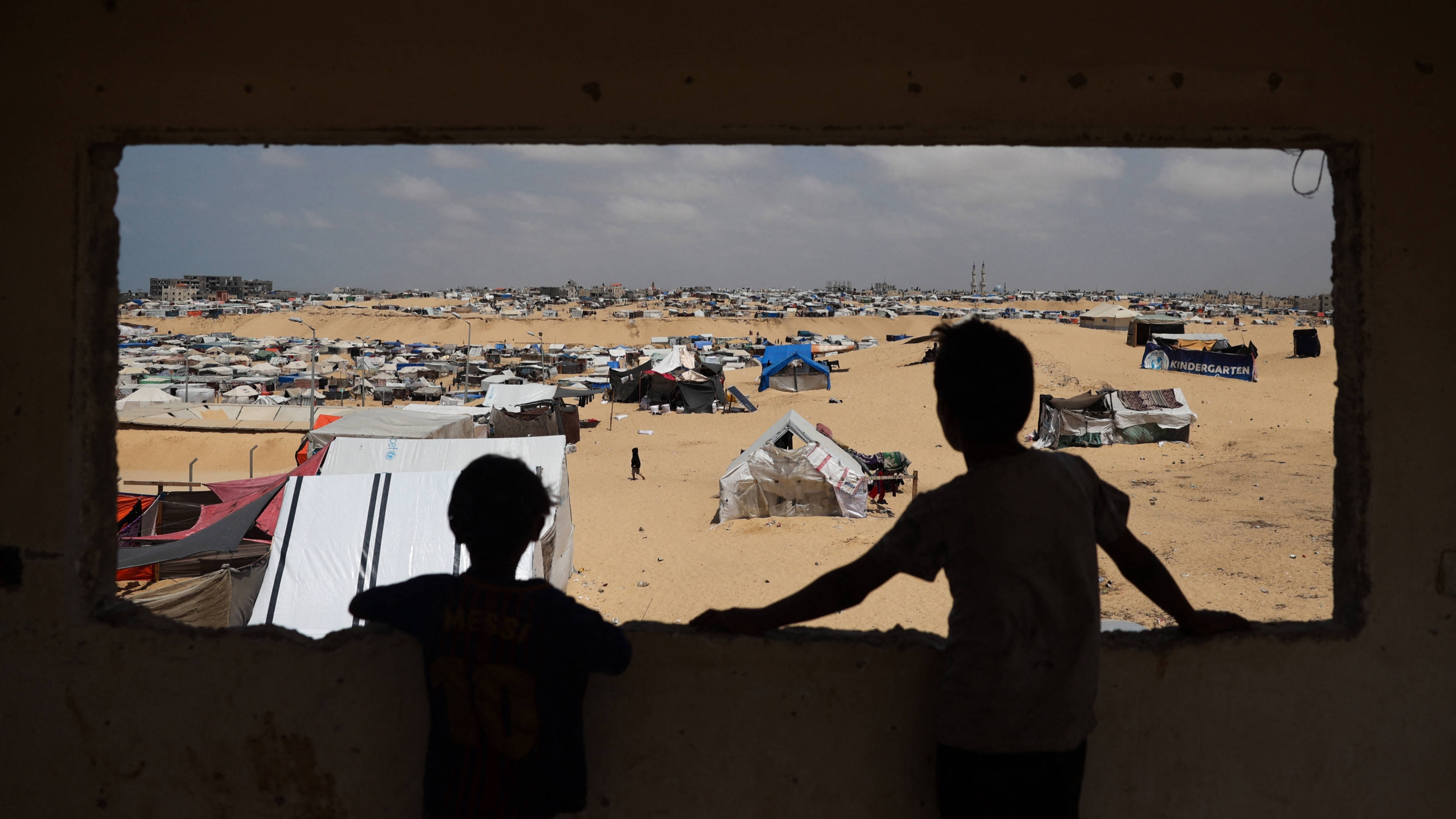
When Anoud was diagnosed with stomach cancer in July 2023, she never imagined her path to recovery would unfold amid a brutal war that would tear her from her husband and two young daughters.
That summer, when presented with a treatment plan, doctors informed Anoud that she would need to travel frequently to the occupied West Bank for chemotherapy sessions, as they were unavailable in the besieged Gaza Strip.
A few months later, war erupted in Gaza and the Israeli military tightened its siege on the enclave, blocking essential supplies such as water, electricity, fuel, food and vital medications. This left countless Palestinians without access to the necessary treatments or the possibility of seeking them elsewhere.
“She was supposed to travel to take her doses, but she couldn’t due to the war. Unfortunately, that led to the spread of cancer in her body. Her condition has deteriorated to the point where she has lost the ability to move,” her husband, Ibrahim Rayyan, told Middle East Eye.
After numerous appeals, the Palestinian health ministry in the West Bank facilitated Anoud's travel to Egypt.
New MEE newsletter: Jerusalem Dispatch
Sign up to get the latest insights and analysis on Israel-Palestine, alongside Turkey Unpacked and other MEE newsletters
On 17 April, Anoud set out for the Rafah Crossing with Ibrahim and their daughters, aged six and three. However, Egyptian authorities informed them that her husband and children were not registered in the travel records, preventing them from accompanying her.
With no other choice, Anoud continued her journey to Egypt with her mother-in-law and then travelled to Doha for further treatment.
To reunite the family, Ibrahim launched a crowdfunding campaign to cover the $10,000 required for their travel permits, which had to be paid to an Egyptian intelligence-affiliated travel agency called Hala Consulting and Tourism Services.
Middle East Eye reported in May that Hala was earning $2m daily from Palestinians fleeing the war in Gaza, where the poverty rate reached 64 percent in 2023, according to the World Bank.
The family’s travel appointment was scheduled for 21 May, just days after the Israeli army occupied the Rafah crossing, halting all travel in and out of Gaza.
'Why did they prevent us from travelling with mum? I miss her so much. The war is so scary without her. I need mum'
- Watin, Anoud's daughter
“Why did they prevent us from travelling with mum? I miss her so much. I desperately need her. The war is so scary without her. I need mum,” Anoud’s six-year-old daughter, Watin, tearfully told Middle East Eye.
Rayyan said his daughters are in anguish, constantly asking about their mother and wondering when Israel will reopen the crossing so they can be reunited.
“They are just children and need to be with their mum. Whenever they hear bombings, they run to me, saying: ‘Please take us to mum. There's no bombing there.’ It’s too much for me to be both a father and a mother, especially during a war,” Rayyan said.
“Anoud always tells me she regrets leaving and wishes she had stayed in Gaza, even if it meant dying with her daughters from lack of treatment. I am doing my best to support her. Thankfully, she is getting better now.”
As Israel continues to occupy strategic areas in Gaza, including the Netzarim Corridor, which cuts through central Gaza, and the Philadelphi Corridor, connecting the strip to Egypt, Hamas said there would be no ceasefire deal without the Israeli army's withdrawal.
‘Indelible psychological marks’
After six months of displacement, living in tents and UN shelters, Rania, a mother of three, made the painful decision to flee to Egypt with her children. However, her husband was unable to accompany them at the time.
“It was so heartbreaking to leave dad. He used to reassure us when we were scared of the bombings. My heart shattered when our house was bombed. I don’t even know what happened to Soso, my turtle. I think of her a lot. I miss my bed and my dolls. I miss life before the war,” Siba, Rania’s 10-year-old daughter, told MEE.
Although Egypt is safe, the psychological toll of the war lingers. Rania said her children are deeply traumatised and fearful of any sudden loud noises.
“They are deeply traumatised. The war has left indelible psychological marks. It’s like tattoos. I feel there’s no need to even ask for psychological intervention. I wish the day of judgement would come, and this whole life would be over,” she added.
Siba and her siblings now attend primary school in Egypt, but adjusting has been difficult.
“I don’t have friends here. I want to go back to my school in Gaza, where my friends are. I loved my school there because mum and dad would take us to buy our new rucksack and stationery. But I keep going to school here, for mum and dad's sake,” Siba said.
Communication with their father has been sporadic due to the lack of internet in many parts of Gaza, increasing the children’s anxiety.
“I always think of dad. I always ask mum if he has food, water and shoes. I feel so guilty when mum cooks stuffed marrow, his favourite meal,” Siba said.
Rania admitted that her children miss their father so much they sometimes blame her for leaving Gaza without him.
“They blame me for travelling without their father as if it was my decision to leave without him. I always tell them it was our only chance to survive the war. I try to reassure them, even though my own heart is shattered and I’m terrified for his safety. We were left with no choice,” Rania said.
“Imagine having to be grateful for this difficult situation in Egypt simply because we managed to escape the war after six months of living in hell in Gaza.”
‘I have lost everything'
The closure of the Rafah crossing has upended the lives of tens of thousands of people in Gaza, including many with urgent needs. Among them is Hamza Salha, a former Erasmus student who spent two semesters studying in Malaga, Spain.
'They blame me for travelling without their father as if it was my decision to leave without him'
- Rania, mother of three
In January, he was awarded a scholarship to complete his bachelor’s degree in English literature and begin a master's degree in Spain. However, he was unable to travel after being injured in an Israeli air strike that also claimed the life of his lifelong friend.
With the Rafah crossing now closed, Hamza’s scholarship has been revoked.
“I’ve endured starvation, lack of medical treatment, water and all the basics because I held on to the hope that I could escape the war and reach Spain. It wasn’t just a scholarship; it was my only way to survive and secure my future. But I lost it because of the crossing's closure,” Hamza said.
“What’s more difficult than travelling from Gaza to Spain is trying to travel 35km from Jabalia to the south. I’m terrified of the new Israeli military checkpoints. They’ve indiscriminately arrested and killed many civilians," Hamza added.
“I have lost everything now. It’s hell.”
Middle East Eye delivers independent and unrivalled coverage and analysis of the Middle East, North Africa and beyond. To learn more about republishing this content and the associated fees, please fill out this form. More about MEE can be found here.


